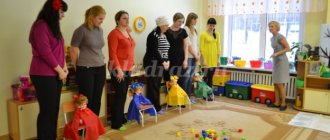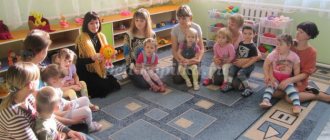Conversations on moral and patriotic education in a group of children aged 2 to 3 years
Conversations on moral and patriotic education
in a group of children from 2 to 3 years old
September
- Conversation with children about where they spent the summer
Target:
Give an idea of the family. Learn to call family members by name. Conversations with children about what they drove on their summer vacation, what they saw around them;
- Getting to know the street
Target
: Formation of children's initial street behavior skills;
- Talking with children about home addresses
Target:
Encourage children to give their home address and the names of their family members;
- Conversation about City Day
Target:
Introducing children to the name of the city in which they live.
October
- Talking with children about younger brothers and sisters
Target:
Record the names of family members. Looking at a family photo;
- Repetition. Talking with children about home addresses
Target:
Continue to teach children to remember their home address and name the names of their family members;
- Conversation about home country
Target:
Introduce children to the name of the country. Consider illustrations about the nature of Russia;
- Conversation with children about the area where children walk
Target:
Take your children for a walk around the area near the nearest houses. Introduction to a new active Russian folk game;
November
- Conversation with children about grandmothers
Target:
Help children understand that everyone has two grandmothers, they need help. Learn to name grandmothers and love them. Looking at photographs of grandmothers, teaching children to treat the older generation with care;
- A conversation about what needs to be done to keep the city clean
Target:
Teach children to keep order and not throw trash on the ground. Display of illustrations depicting the main attraction of the city;
- Conversation “There is no better native land”
Target:
Continue to introduce children to the national culture. Looking at illustrations
- Conversation about nesting dolls
Target:
Tell the children how the matryoshka came into being and activate the vocabulary. Games with matryoshka dolls.
December
- Conversation about grandfathers
Target:
Give children an idea of what family is. Continue to teach children to name the names of family members and treat them with love.
- Conversation with children about what family is
Target:
Bring children to understand what a family is. Forming in every child the confidence that adults love him, like all other children.
- Conversation “We are polite children”
Target:
Observing the games of older children. Promote the formation of the habit of calmly behaving indoors and outdoors. Reinforce verbal forms of polite requests to adults and children.
- Conversation “We are friendly guys”
Target:
Teach children to play without quarreling, to share toys. Contribute to the creation of a calm, friendly environment in the group.
January
- Conversation about New Year's performances attended by children
Target:
Involving children in winter fun. Developing the ability to monitor the actions of fairy-tale characters and respond adequately to them.
- Conversation “We are already big and can take care of adults”
Target:
Promote friendly communication with adults, teach assistance in performing simple actions
- A conversation about Russian folk tales known to children
Target:
Introducing children to national culture. Forming an understanding that you can learn a lot of interesting things from books
- Conversation about home addresses
Target:
continue to teach children to tell their home address and the names of their family members
February
- Conversation about where the children were in the city on weekends.
Target:
Promote the formation of the habit of calmly behaving indoors and outdoors. Show interest in your surroundings. Observe the rules of basic politeness;
- Conversation about who you live with
Target:
Continue to teach children to remember the names of their family members. Develop a friendly attitude towards loved ones.
- Conversation “About the holiday - Defender of the Fatherland Day”
Target:
Fostering respect for the defenders of the Fatherland. Know and respect the culture of the country. Bright street decorations, fireworks.
- Conversation “About the main attraction of your hometown”
Target:
To develop children’s ability to examine an object. Fostering respect for working people.
March
- Conversation with children about folk toys
Target:
Development of children's interest in folk toys. The teacher's story about toys: nesting dolls, whistles. Continue to introduce children to the national culture.
- Conversation “About the holiday - March 8th”
Target:
Continue to develop a feeling of love and care for your mother. Give an idea of a mother’s work at home.
- Conversation about what family is
Target:
Continue to develop a caring attitude towards family and friends. Consolidate knowledge about family members: names, relationships.
- Talking with children about home addresses
Target:
Encourage children to know their home, address, names of their family members
April
- Conversation “We are a friendly family”
Target:
Consolidating knowledge about yourself, family members and their activities
- Conversation “How do you help your mother”
Target:
Continue to teach children to take care of their mother, family members, and speak polite words.
- Conversation “How well-mannered children behave”
Target:
Strengthen the ability to evaluate actions, show by example the negative sides of whims
- Conversation “What good children do”
Target:
Bring to awareness of certain rules of culture, behavior and moral qualities. For example, being polite is good!
May
- Conversation “About the Victory Day holiday”
Target:
Bring children to understand that there are bright street decorations and fireworks around
- Conversation “How we talk to each other”
Target:
Teach children to communicate calmly, without shouting.
- Conversation “Who do we like to play with”
Target:
Bring to awareness of some rules of culture of behavior and moral qualities. For example, being polite is good! They love people who are polite, kind, and attentive; they are good to play with and be friends with.
- Conversation “We are friendly guys”
Target:
Continue to promote the formation of a friendly attitude among each other, the desire to share toys.
Junior group. Early childhood, nursery. Children 1-4 years old
Direct educational activities for the patriotic education of children of the first early preschool age “Family” Direct educational activities for the patriotic education of children of the first early preschool age “Family”
Goal: creating conditions for the formation of a sense of belonging to one’s family as the basis
for the patriotic education of preschool children .
Objectives: Educational:... Outline of a lesson on moral and patriotic education for children 2 years old “Family customs in Russia” MUNICIPAL BUDGET PRESCHOOL EDUCATIONAL INSTITUTION KINDERGARTEN No. 10 “NUTCRACKER”
MUNICIPAL EDUCATION OF SAYANOGORSK
Summary of an open lesson Plan - summary of a lesson on moral and patriotic education for children 2 years old . Topic: “Family customs in “Rus”
”...
Summary of GCD in the 2nd junior group of kindergarten. Patriotic education
Abstract of GCD in the second junior group on patriotic education
Goal : to develop moral and patriotic education in children of primary preschool age. Objectives: 1. Summarize children’s knowledge about the flora and fauna of their native land 2. Reinforce the name “Russia” 3. Reinforce knowledge about the flag.
4. Develop dialogical speech, memory, thinking. 5. Develop fine motor skills of the hands. GCD move:
— Guys, there are many different countries on earth.
What is the name of the country we live in? - Russia. — I suggest you go on a trip around Russia, around our Motherland by train. Do you love to travel? - Children's answers. (Children sit on chairs standing one after another.) - Let's go. Bon Voyage! — The locomotive shouts: “doo-doo!” I'm walking, walking, walking. And the carriages knock, and the carriages say: “Well, well, well, well, well, well” - They stopped. Our station is called "Lesnaya" . What trees grow in the forests of our Motherland? (the teacher shows pictures of trees) - children’s answers. — What birds live in Russia? (pictures of birds) - Children's answers. — What animals live in the forests of our Motherland? (pictures of animals) - Children's answers. - Well done. Let's move on. — The locomotive shouts: “doo-doo!” I'm walking, walking, walking. And the carriages knock, and the carriages say: “Well, well, well, well, well, well” - We stop. The station is called "Fairytale" . Name Russian folk tales (illustrations for the fairy tales “Turnip”, “Kolobok”, “Ryaba Hen”, “Swan Geese”). - Children's answers. - Well done boys. Let's move on. — The locomotive shouts: “doo-doo!” I'm walking, walking, walking. And the cars are knocking, and the cars are saying: “Well, well, well, well, well, well” - The next station is “Main” . Guys, we know that our homeland is Russia. And there is also such a word: “small Motherland”. What is it? This is a small piece of our huge country, this is a city, a street, a house and our kindergarten that you go to. Name the main city of our small Motherland. - Kazan. — Guys, every country has its own flag. Let's remember what colors our flag has. - Children's answers. “Now you and I will rest a little, and everyone will make their own flag.” There are colored strips on the table, and we will glue them in the right order onto the paper. Physical education minute. - Well done boys. Our journey through our Motherland has ended. What did we talk about today? - Children's answers. - At the end of our journey, Albina will recite the poem “Our Motherland” - the Great Land, the Beloved Land, Where we were born and live, We are the bright Motherland, We are the sweet Motherland, We call it our Motherland.
We recommend watching:
Summary of GCD for children of the 2nd junior group on the topic: Winter Summary of GCD cognition using ICT in the 2nd junior group. Journey to the autumn forest Notes of GCD in the 2nd junior group: Wild animals Notes of GCD on speech development in the second junior group topic: Vegetables
Similar articles:
Summary of lessons in kindergarten in the 2nd junior group. Group room
Summary of lessons in kindergarten in the 2nd junior group. My family
Summary of a lesson in the junior group of kindergarten on the topic: “Human nutrition”
Lesson notes about kindergarten. Junior group

